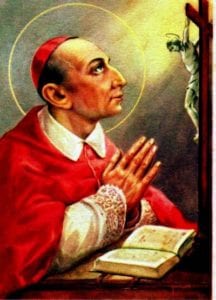
Saint Charles Borromeo (1538-1584 AD)
Feast Day: November 4
The season of Advent
Beloved, now is the acceptable time spoken of by the Spirit, the day of salvation, peace and reconciliation: the great season of Advent. This is the time eagerly awaited by the patriarchs and prophets, the time that holy Simeon rejoiced at last to see. This is the season that the Church has always celebrated with special solemnity. We too should always observe it with faith and love, offering praise and thanksgiving to the Father for the mercy and love he has shown us in this mystery. In his infinite love for us, though we were sinners, he sent his only Son to free us from the tyranny of Satan, to summon us to heaven, to welcome us into its innermost recesses, to show us truth itself, to train us in right conduct, to plant within us the seeds of virtue, to enrich us with the treasures of his grace, and to make us children of God and heirs of eternal life.
Each year, as the Church recalls this mystery, she urges us to renew the memory of the great love God has shown us. This holy season teaches us that Christ’s coming was not only for the benefit of his contemporaries; his power has still to be communicated to us all. We shall share his power, if, through holy faith and the sacraments, we willingly accept the grace Christ earned for us, and live by that grace and in obedience to Christ.
The Church asks us to understand that Christ, who came once in the flesh, is prepared to come again. When we remove all obstacles to his presence he will come, at any hour and moment, to dwell spiritually in our hearts, bringing with him the riches of his grace.
In her concern for our salvation, our loving mother the Church uses this holy season to teach us through hymns, canticles and other forms of expression, of voice or ritual, used by the Holy Spirit. She shows us how grateful we should be for so great a blessing, and how to gain its benefit: our hearts should be as much prepared for the coming of Christ as if he were still to come into this world. The same lesson is given us for our imitation by the words and example of the holy men of the Old Testament.
Practice what you preach
I admit that we are all weak, but if we want help, the Lord God has given us the means to find it easily. One priest may wish to lead a good, holy life, as he knows he should. He may wish to be chaste and to reflect heavenly virtues in the way he lives. Yet he does not resolve to use suitable means, such as penance, prayer, the avoidance of evil discussions and harmful and dangerous friendships. Another priest complains that as soon as he comes into church to pray the office or to celebrate Mass, a thousand thoughts fill his mind and distract him from God. But what was he doing in the sacristy before he came out for the office or for Mass? How did he prepare? What means did he use to collect his thoughts and to remain recollected?
Would you like me to teach you how to grow from virtue to virtue and how, if you are already recollected at prayer, you can be even more attentive next time, and so give God more pleasing worship? Listen, and I will tell you. If a tiny spark of God’s love already burns within you, do not expose it to the wind, for it may get blown out. Keep the stove tightly shut so that it will not lose its heat and grow cold. In other words, avoid distractions as well as you can. Stay quiet with God. Do not spend your time in useless chatter.
If teaching and preaching is your job, then study diligently and apply yourself to whatever is necessary for doing the job well. Be sure that you first preach by the way you live. If you do not, people will notice that you say one thing, but live otherwise, and your words will bring only cynical laughter and a derisive shake of the head.
Are you in charge of a parish? If so, do not neglect the parish of your own soul, do not give yourself to others so completely that you have nothing left for yourself. You have to be mindful of your people without becoming forgetful of yourself.
My brothers, you must realize that for us churchmen nothing is more necessary than meditation. We must meditate before, during and after everything we do. The prophet says: I will pray, and then I will understand. When you administer the sacraments, meditate on what you are doing. When you celebrate Mass, reflect on the sacrifice you are offering. When you pray the office, think about the words you are saying and the Lord to whom you are speaking. When you take care of your people, meditate on how the Lord’s blood that has washed them clean so that all that you do becomes a work of love.
This is the way we can easily overcome the countless difficulties we have to face day after day, which, after all, are part of our work: in meditation we find the strength to bring Christ to birth in ourselves and in other men.